- Home
- Joel Rosenberg
Hour of the Octopus Page 2
Hour of the Octopus Read online
Page 2
Arefai looked at it with distaste, then put an expression of polite concern on his face.
“Please,” he said, “Kami Dan’Shir. You have been invited to break your fast with me; you need not await my specific invitation to begin your meal.”
The way I normally began the day with breakfast was by skipping it. Later on in the morning, partway into the hour of the hare, Madame Lastret’s Two Dog Inn would open on Ankersa Way, just at the edge of the Bankstreets in the town of Den Oroshtai, and I tended to take my first meal there, or at Madame Rupon’s. While the pay of Lord Toshtai’s dan’shir was moderately generous, hour-by-hour duties had not been assigned; as long as a runner or Runner from the castle could reach me, I was unlikely to be in trouble.
I guess I should have worked out an arrangement with whoever in the kitchen cooked breakfast, instead of with Madame Lastret and Madame Rupon.
What I wished for was the old company, the juggling and foolery that always went along with meals in the Troupe of Gray Khuzud. What I wanted was my little sister, Enki Duzun, showering five eggs and an apple, while Fhilt took two spoons and kept three dollops of jam in the air until one of the Eresthais would snatch the dollops away, one by one, with slices of bread.
Well, at least this was more than peasant food. Bread and onion would have been the local peasant breakfast in Den Oroshtai, and if I’d still been a peasant, that would have been all I would have been offered by the castle servitors, most likely; certainly nothing more than dirt-food. Had I been only middle class, that might have been supplemented by a tree-fruit, an apple or a pear. As a true hereditary bourgeois—albeit, granted, the first of my line—I’d been honored with not only butter but meat. No tea, of course, nor sauce, nor game. But I wasn’t a member of our beloved ruling class, after all.
Me, I prefer rooming houses, where what one eats depends more on what one can pay than upon the status of the buttocks against which one’s mother once drummed her heels.
The ham was edible, although it could have stood a proper soaking; then again, perhaps salted ham with salt is a taste I’ve simply not acquired. I left it on my plate. The apple wasn’t bad, just a bit mealy around the edges. But the bread was good and solid and still warm, and the butter was cold and smooth and rich and creamy, and that would do—for the time being. Wheedling a snack out of a cook is a skill that I’d picked up many years before.
“You don’t seem excited by the idea of hunting, Kami Dan’Shir,” Arefai said. “And on such a fine day.”
“Hunting is a noble pursuit, Lord,” I said. You know, like pronging away at unwilling peasant girls. I probably felt more adventurous than I should, but perhaps I was flushed with my victory over Crosta Natthan. I went on: “Perhaps if I was raised to the nobility, Lord Arefai, I’d feel differently.”
“You’ve been a bourgeois how long?”
“Almost a month, lord.”
He chuckled. “I think perhaps you might consider waiting some years before broaching the matter to my father; he has no sense of humor.” He tapped himself lightly on the chest. “I, on the other hand, do. You have dined with me; you will now hunt with me.”
One of the guards started, stilled instantly by a glare from the more senior.
Arefai took a final sip of tea and tossed his eating sticks aside; with a quick, beckoning flick of his fingers, he rose, not waiting to see if I was following.
We headed out of the garden, and down the path into a fine day. Two pairs of bodyguards walked in front of us, while the trio behind us kept up a marching song, the baritone taking up the verse and melody, the tenor gracing the end of each phrase with a high harmony that soared above like a bird, while the bass sang a slow countermelody that still managed to keep perfect time.
“A perfect day for a hunt, eh, Kami Dan’Shir?” Arefai gestured with a vague but possessive wave. Nobles own the day, it seemed.
Again, I agreed with him. “Of course.”
He eyed me carefully; the implied reproach in the short answer hadn’t escaped him.
Smiling agreeably, I ignored his look, or at least tried to look like I was ignoring his look.
I had to be careful around Arefai; since he was in some contexts such a pleasant dolt, it was important for me to remind myself that he was a blooded warrior, and worldly in the ways of statement and understatement, the form of speech called shtoi in Old Shai. It’s never been safe to disagree with members of our beloved ruling class, even if you’re a member of our beloved ruling class, and an almost formal mode of overstatement and understatement had grown up, passed on with indirectness from parent to child, from husband to wife and wife to husband, becoming more indirect, more ambiguous, and less precise as time went on, because directness, clarity, and precision could lead to trouble.
Trouble in D’Shai is often fatal.
“You seem to lack some… enthusiasm, Kami Dan’Shir,” he said.
I had been hoping he would let it drop. I would have been happy to.
“Not at all, Lord Arefai,” I said. “I’m honored that you would give me such a—” I put in the slightest of hesitations, just a moment of robbed time “—unique opportunity.”
“You’ve never hunted?”
I weighed the odds, and decided that Arefai was not going to take violent offense at something that had happened more than half D’Shai away, so I decided that being truthful was, at least for once, the safest thing to do, and put on my most engaging smile.
“Well, no, Lord. But accidents happen. When you’re walking through the roads high in the mountains of Helgramyth, it often happens that the innocent bits of wet twine you have set out the night before—”
“Snares?”
I spread my hands. “Oh, no, Lord. Simply to dry. The weather is often damp high in the mountains of Helgramyth.” Of course, the need to tie the twine into a noose was not apparent, nor the need to set up a bent sapling and a carved trigger for the noose, so I didn’t mention it.
He nodded. “I see.”
“Well, it sometimes happens that when you’re drying your twine, as the saying goes, a rabbit will on occasion tangle itself in your twine and be dead by morning. Now, even a peasant is allowed to eat dead animals he finds; that’s hardly hunting.”
I didn’t go into how the rabbits are quickly skinned and roasted, the skin, bones, and offal buried before you swing out on the day’s march, lest anybody walking along the path misunderstand and think that you’d been snaring rabbits.
“This happens often?”
“Rarely, Lord. And never within the domain of Lord Toshtai, of course.” I tried on my most sincere voice.
His nod accepted me at my word.
Horses were saddled and hitched to the viny hitching trellis at the stables. Beyond, half a dozen or so matched brown horses pranced, their riders, the guards, already in the saddle.
Arefai’s horse stood waiting for him, a coal-black mare, its hooves lacquered to a high gloss and crimson and yellow flowers woven into its long mane. A dull, almost taupe gelding stood listlessly waiting for me.
I didn’t know whether to be jealous of Lord Arefai’s fine animal and resentful I’d been given such a drab mount, or happy that I wasn’t going to be bouncing on the back of an animal I’d be decidedly unable to control. The dull little gelding suited me, I decided as I climbed up the trellis and gingerly lowered myself into the saddle. While richer peasants have draft horses, horses as riding animals are permitted only to the bourgeois and members of our beloved ruling class—it would be a shame to have the head of a peasant sit higher than that of a lord—and both horses and saddles were a relatively new thing to my tender bottom.
This was the third—no, fourth—time that I had been on a horse—each time to accompany Arefai—and it was no better than the first. With every step, the saddle would try to jerk my hips forward; when the horse broke into a faster pace (a canter, they call it; I call it a personal assault) it would try to bounce my buttocks up around my ears.
Personal
ly, I would rather have walked. That I can do well.
Thankfully, Arefai wasn’t in a hurry this morning, so he kept his mare at a slow walk, the smaller gelding briskly stepping to keep up, prodded with a sheathed lance by one of the trailing bodyguards when it lagged.
Well, at least they weren’t prodding me; I take what good fortune I can get.
Chapter 2
The joy of the chase, the thrill of the hunt, and other blatant falsehoods.
The hunting preserve lay most of an hour’s ride to morningwise of the keep: a fan-shaped expanse of forest, fields, and three lakes, some of it as carefully trimmed and maintained as the gardens in the inner court, other parts allowed to go wild.
We talked as we rode past square fields of wheat and rice—each one a standard one peden in area; Lord Toshtai divides land neatly—to where a forested ridge of low hill was broken only by our road.
More accurately, Arefai talked and I listened; his wedding with Lady ViKay of Glen Derenai was coming up in a few weeks, although it had yet to be formally announced, and he was having to take time from his other activities to supervise the preparation of her quarters, adjoining his.
I had spent a few moments in Arefai’s rooms, once. His tastes were simple and really quite good. I understood ViKay’s to be other than simple, and perhaps not entirely possible. If I understood Arefai correctly, it seemed she wanted her rooms floored with warm green marble; she needed privacy screens that wouldn’t interfere with the air flow fitted tightly over the windows; she simply must have ancient Mesthai artwork newly carved for the headboard of her sleeping pallet; and she fully expected Arefai to supervise the installation of all of that.
I didn’t voice my limited sympathy at how this was such a dreadful imposition on his time. It appeared he was forced to cut back to what sounded like a mere one full afternoon of massage, two evenings pronging peasant girls and no more than that with his concubines, and perhaps as few as three morning hunts. It’s important that those of us of the lower classes show proper sympathy with the burdens of our beloved ruling class.
Lord Toshtai’s chief huntsman, Garvi Denten, and his gamekeeper, Deroy Rawn, were waiting for us outside the hunting shelter, where open wooden cages and leather harnesses stood stacked neatly on the bare dirt.
I had seen the two of them only from a distance. Neither acrobats nor dan’shirs spend much time around huntsmen; this was my first chance to examine them closely.
Most men who spend their lives outdoors develop a tan to their skins, but Garvi Denten was red as a brick, and shaped like one, blocky and solid, from the thick, scarred neck where his studded collar hung loosely, to the splayed toes at the end of his massive feet. Dressed in a burlap overshirt and drawstring muslin pantaloons, he looked rather more like a peasant than a hereditary bourgeois, and a pretty disreputable peasant, at that.
Deroy Rawn, on the other hand, was dark and smooth where his master was red and rough. His skin was the color of urmon tea, his face freshly shaven beneath the well-oiled mustache that decorated his upper lip. The fingers of his hands, as he gestured at the darkness of the hunting lodge, were long and aristrocratic, the nails clean and unbitten.
A conclusion that I didn’t have to raise kazuh for: Deroy Rawn was a pompous ass, despite the meaning of his name. Huntsmen are bourgeois; gamekeepers are only middle class. It’s an anomaly, and if I were the Scion I’d reclassify gamekeeping as a bourgeois profession. After all, head gamekeeper is almost as common a route to chief huntsman as assistant huntsman is.
But Deroy Rawn was trying to make it look as though he were the bourgeois, and that spoke of a self-important view of his position and himself.
They both bowed deeply at Arefai as the lord dismounted.
Arefai dropped easily to the dirt and walked smoothly to the two men, while I climbed painfully down out of the saddle and staggered behind.
Well, the upper classes have to have tougher bottoms than the rest of us; they spend most of their time sitting down while somebody else does something for them, whether it’s a cook feeding them, a troupe of acrobats and musicians entertaining them, or a horse carrying them. It’s surprising that their women don’t tend to grow immensely broad of beam.
I didn’t like the sneer on Deroy Rawn’s lip, so I made a calculated bow to the two huntsmen—not terribly deep, and a bit perfunctory: a bow of equals, or perhaps of a gracious senior.
“I am Eldest Son Discoverer-of-Truths,” I said, introducing myself formally. Old Shai is formal for everything but names; we introduce ourselves in modern language on formal occasions, or when we are battering each other about with inappropriate formality.
Deroy Rawn was holding a bow and a packet of arrows for Arefai, and had to spread a cloth and set them down— carefully; he didn’t want to let either touch the ground—on top of one of the cages in order to return my bow. His face was smooth and impassive, but I already had the idea we weren’t going to become fast friends.
His return bow was a bit too shallow. The smart thing to do was ignore it, but Arefai had noticed me notice, and was watching to see what I would do.
So was I, actually. I went on, as though I hadn’t finished introducing myself: “—kazuh Dan’Shir, and historical master of truth-discovery.”
Garvi Denten muffled a smile as he bowed deeply, only a hair less than he would have done before a noble. “I am Eats Chicken,” he said, “Huntsman to the third generation.”
Deroy Rawn had to bow even more deeply than his master. “I am Passes Wind,” he said.
I take it you have not gotten permission to change your name, I didn’t quite say. I could see how Garvi Denten might well want to put the gamekeeper in his place by addressing him formally when he got impertinent. Which probably meant that he had always served somebody who didn’t care for him, or who he suspected didn’t care for him.
Arefai had finished removing his sandals, and stood barefoot in his snowy hunting tunic and the silk pantaloons that were shirred tight at knee and ankles, but blousy above and below. They rippled in the wind, like the grasses at his feet.
He slapped his hands together. “The hunt, good Garvi Denten, the hunt. What are we hunting today?”
Garvi Denten bowed again. “Lord Arefai specified some light hunting, so I thought perhaps some quail, a fish or two, and then game of some sort.” He eyed the spears leaning up against the wall of the shelter. “Boar might be possible, but—”
“One would hardly call boar hunting light, eh?” Arefai nodded. He accepted a short bow and a bundle of perhaps half a dozen arrows, the bundle secured with two twists of silver wire, while Garvi Denten belted a silver-trimmed quiver about his waist.
I unlaced my own sandals and tossed them aside as Deroy Rawn handed me a bow, bundle, and quiver, and awkwardly belted the quiver around me. What I was going to be able to do with all this was not exactly clear to me. I’d never so much as held a bow in my hands, and suspected that there was some serious sleight to its use.
Arefai set one end of his bow between his ankles and levered it against the inside of his knee to bend it into a curve, snapping the bowstring into place as he did.
That appeared easier to do than it was. When I tried it, the end slipped out and sent the bow tumbling to the grass.
With a superior smirk, Deroy Rawn strung the bow and handed it to me. “Good hunting, Kami Dan’Shir,” he said.
Arefai was watching me impatiently; we set off.
The hunting trail, barely wide enough for the two of us to walk side by side, was a stone footpath leading off down the slope toward where the carefully manicured brush broke on freshly scythed grass. Each stone, individually shaped and polished to a gentle convexity, was smooth and damp beneath my feet, although it had not rained the night before.
I could almost see the huntsmen with their pails and brushes, cleaning it for the delectation of Arefai’s feet.
The trail bent, then straightened. Above, huge elms towered, their arcing branches turning the p
ath into a leafy tunnel of dark green. Off in the distance, a hairy owl tarooed, and something small scampered from branch to branch. I would have thought that a hunt ought to be conducted in silence—my own experience of walking the roads of D’Shai suggests that animals stay away from people making noise—but Arefai wanted to talk. It was his chance to play teacher, I suppose.
“It’s a good idea to travel with an arrow nocked, but—” he stopped as he looked over at me. “No, no, not the big broadhead; use the half-moon arrow. That’s the right one for quail.”
He selected an arrow for me and helped me fit it to my bowstring, then took up his own bow and a similar arrow; it was tipped with a half-moon of sharpened steel, edged like the edge of a sword, but thin and light.
Ahead, the path widened as it opened on a grassy meadow that angled down to the pond. The flat stones circled the edge of the pond, vanishing again into a leafy green tunnel.
A waterwalker stood on one leg on one bank, its long, pointed bill in profile, as though it was looking over its left wing. My own suspicion, that one of its wide eyes watched us while the other looked for prey, was quickly confirmed when it blurred into motion. Its feet slapped in an impossibly rapid tattoo first against the muddy bank, and then against the surface of the water as it scurried across the pond, not pausing for a moment in its mad dash as it dipped its beak, then straightened, a wriggling fish momentarily in its grip. It tossed the fish high, and snapped it down before it reached the other side of the pond, only to stumble comically on the bank.
I’d seen it happen before and I saw it again: perhaps a dozen other waterwalkers rose from the grasses rimming the pond and dashed across, some catching fish, most not.
Then the pond lay silent, its glassy surface broken only by the last ripples of the birds’ wakes.
Where the path broke on the meadow, it opened on a low green marble podium large enough for the two of us to stand comfortably, then bent to the right, cupping the edge of the pasture. The far side of the podium was occupied by a waist-high table where a dark silver pitcher sat, its bright sides beaded with dew to the halfway point. A tall stemmed glass stood next to the pitcher; Arefai set his bow down on the table and poured himself some of the golden, bubbly liquid, drinking deeply before he set the glass back on the table.

 The Road Home
The Road Home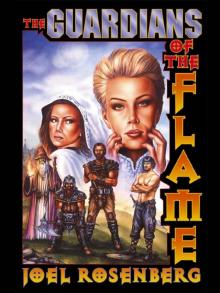 The Sword and the Chain
The Sword and the Chain Not Quite Scaramouche
Not Quite Scaramouche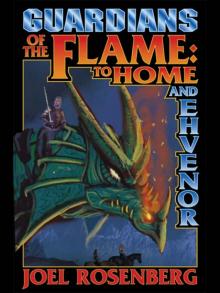 Guardians of The Flame: To Home And Ehvenor (The Guardians of the Flame #06-07)
Guardians of The Flame: To Home And Ehvenor (The Guardians of the Flame #06-07)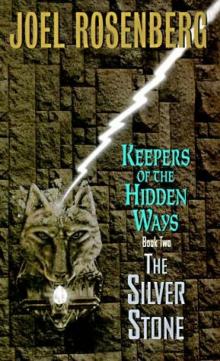 The Silver Stone
The Silver Stone Hero
Hero Not For Glory
Not For Glory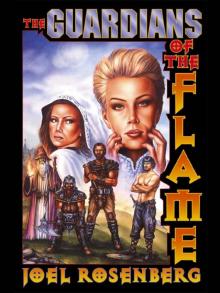 The Sleeping Dragon
The Sleeping Dragon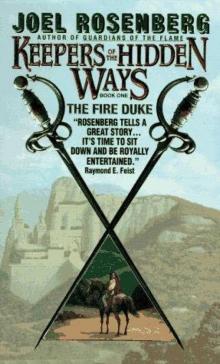 The Fire Duke
The Fire Duke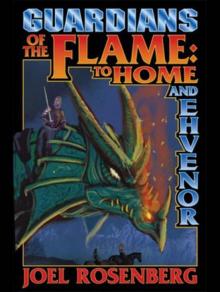 Guardians of The Flame: To Home And Ehvenor (Guardians of the Flame #06-07)
Guardians of The Flame: To Home And Ehvenor (Guardians of the Flame #06-07)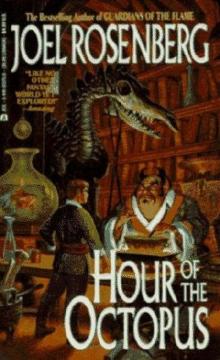 Hour of the Octopus
Hour of the Octopus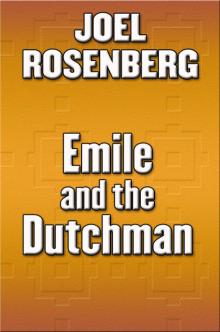 Emile and the Dutchman
Emile and the Dutchman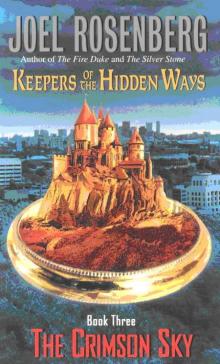 The Crimson Sky
The Crimson Sky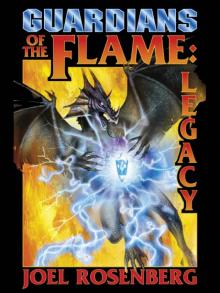 Guardians of the Flame - Legacy
Guardians of the Flame - Legacy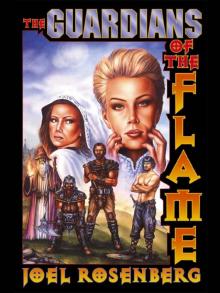 The Silver Crown
The Silver Crown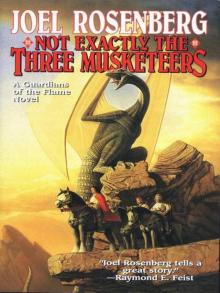 Not Exactly The Three Musketeers
Not Exactly The Three Musketeers Not Really the Prisoner of Zenda
Not Really the Prisoner of Zenda